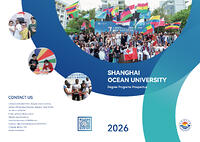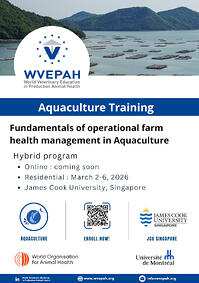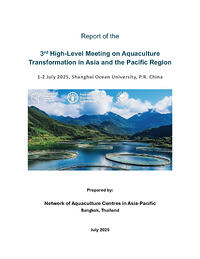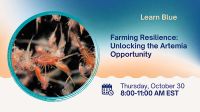Reports received in 2025, as of the 2nd quarter, only came from few member governments including: Australia, Hong Kong SAR, India, Indonesia, Malaysia, Myanmar and Saudi Arabia. Listed below are the reported aquatic animal diseases covering the first and second quarters of 2025. The original and updated reports can be accessed at the Quarterly Aquatic Animal Disease report page.
Shanghai Ocean University is accepting applications for full-scholarship PhD programmes across marine sciences, including aquaculture, fisheries, food science, marine engineering, and related fields. The 2026 intake welcomes international scholars under 35 years old with a master's degree and strong research potential.
Scholarships cover tuition, accommodation, medical insurance, and provide a monthly stipend. This is an opportunity to study cutting-edge disciplines at a leading institution while joining a vibrant international research community. The application deadline is 1 February 2026. The university also offers postdoctoral and faculty positions for exceptional candidates.
Ready to advance your marine science career? Download the prospectus, visit the application portal or contact the International Student Office for full programme details and eligibility requirements.
The World Veterinary Education in Production Animal Health (WVEPAH) invites applications for Module I: Fundamentals of Farm Health Management in Aquaculture - part of a certification programme leading to worldwide recognition in Aquaculture Production and Health, delivered by Université de Montréal and validated by the World Organisation for Animal Health (WOAH).
This advanced hybrid training combines 40 hours of online learning with a residential week at James Cook University, Singapore, from 2-6 March 2026. The programme prepares aquaculture professionals to support farmers in disease prevention, biosecurity, surveillance, and product quality at farm, watershed, and national levels.
The course adopts a One Health approach, covering environment, nutrition, farm management, physiology, pathology, biosecurity, diagnostics, epidemiology, and international regulations. Through field visits and diagnostic laboratories, participants develop practical skills in necropsy, sampling, and case analysis.
Early bird registration (€2,400) closes 2 January 2026; regular fee €2,600.
The third High-Level Meeting on Aquaculture Transformation assessed progress towards 2030 transformation goals and identified priority actions for the Asia-Pacific region. The meeting report, covering discussions held 1-2 July 2025 in Shanghai, documents findings from representatives of NACA member governments, FAO and regional organisations.
Participants identified multiple barriers to sustainable intensification: farmer scepticism about unfamiliar technologies, limited access to expertise, and misaligned incentives that prioritise profit over environmental responsibility. Investment remains concentrated at higher levels rather than reaching small-scale producers. The discussions emphasised collaborative approaches, knowledge-based farming systems, and the need to document aquaculture's positive social impacts.
NACA and FAO will continue supporting National Innovation and Investment Plans in India, the Philippines, Thailand and Vietnam. Future work includes establishing an Aquaculture Innovation and Investment Hub and developing monitoring systems to track transformation progress across the region.
A free webinar "Farming resilience: Unlocking the Artemia opportunity" will be held on 30 October from 8:00-11:00 EST (13:00-16:00 UTC). This webinar will present the results of an in-depth analysis of Artemia production, conservation and investment opportunities by the World Bank Group, with expert input from members of the International Artemia Aquaculture Consortium.
Artemia (brine shrimp) is a critical live feed in aquaculture, particularly in hatcheries for shrimp, fish, and ornamental species. Its production and sustainable management are increasingly important as aquaculture expands globally. Global Artemia markets face increasing demand, while new innovations in farming, processing, and conservation offer opportunities for inclusive investment, resilience, and biodiversity protection.
This event will bring together global experts, policymakers, private sector representatives, and development partners to discuss the state of Artemia production and conservation, market opportunities, regulatory frameworks, and pathways for sustainable and viable investment.









